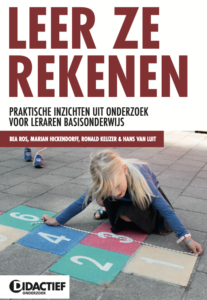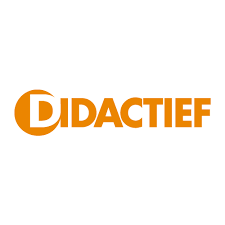Leer ze rekenen – praktische inzichten basisonderwijs

|
In de kennisbundel ‘Leer ze rekenen’ lees je – anno 2022 – de belangrijkste bevindingen over reken-wiskundeonderwijs in het PO. Bijbehorende website Leer ze rekenen |
Samenvatting
Samen met taal en lezen vormt rekenen het fundament onder het curriculum van de basisschool. Rekenen is een taal apart die leerlingen zich moeten eigen maken, namelijk de taal van getallen, hoeveelheden en patronen. Rekenonderzoekers Marian Hickendorff, Ronald Keijzer en Hans van Luit selecteerden 25 kernpublicaties uit de schatkamer van het (internationale) onderzoek over rekenen en rekenonderwijs. Onderwijsjournalist Bea Ros maakte de inzichten hieruit toegankelijk voor de praktijk van de leraar. In de meeste hoofdstukken vertellen leraren in praktijkkaders hoe ze de theorie toepassen in hun klas.
Ros, B., Hickendorff, M., Keijzer, R. and Van Luit, H. (2021). Leer ze rekenen. Praktische inzichten uit onderzoek voor leraren basisonderwijs. Didactief.
Inhoudsopgave
- Wat is rekenen?
- Beginnend en aanvankelijk rekenen
- Gevorderd rekenen
- Inspelen op rekenontwikkeling
- Bijzondere rekenbehoeften
Webinar
Door Ronald Keijzer
didactiefonline.nl/video/webinar-leer-ze-rekenen
Artikelen die in “Leer ze rekenen” gebruikt worden
- Anderson, A., Anderson, J. and Shapiro, J. (2005). Supporting multiple literacies: Parents’ and children’s mathematical talk within storybook reading Mathematics Education Research Journal, 16(3), 5-26. .
- Assmus, D. and Fritzlar, T. (2018). Mathematical giftedness and creativity in primary grades. In F. M. Singer (Ed.), Mathematical creativity and mathematical giftedness. Enhancing creative capacities in mathematically promising students (pp. 55–82): Springer.
- Aunola, K., Leskinen, E., Lerkkanen, M. K. and Nurmi, J. E. (2004). Developmental dynamics of mathematical performance from preschool to grade 2 Journal of Educational Psychology, 96(4), 699–713. doi:10.1037/0022-0663.96.4.699 .
- Carraher, T. N., Carraher, D. W. and Schliemann, A. D. (1985). Mathematics in the streets and in schools British Journal of Developmental Psychology, 3(1), 21-29. doi:10.1111/j.2044-835X.1985.tb00951.x .
- Confrey, J., Maloney, A. P. and Corley, A. K. (2014). Learning trajectories: A framework for connecting standards with curriculum ZDM Mathematics Education, 46(5), 719–733. doi:10.1007/s11858-014-0598-7 .
- Dowker, A., Sarkar, A. and Looi, C. Y. (2016). Mathematics Anxiety: What Have We Learned in 60 Years? Frontiers in Psychology, 7(APR). doi:10.3389/fpsyg.2016.00508 .
- Friso-van den Bos, I., Van der Ven, S. H. G., Kroesbergen, E. H. and Van Luit, J. E. H. (2013). Working memory and mathematics in primary school children: A meta-analysis Educational Research Review, 10, 29-44. doi:10.1016/j.edurev.2013.05.003 .
- Fuchs, L. S., Fuchs, D., Compton, D. L., Powell, S. R., Seethaler, P. M., Capizzi, A. M., Schatschneider, C. and Fletcher, J. M. (2006). The cognitive correlates of third-grade skill in arithmetic, algorithmic computation, and arithmetic word problems Journal of Educational Psychology, 98(1), 29–43. doi:10.1037/0022-0663.98.1.29 .
- Fyfe, E. R., McNeil, N. M., Son, J. Y. and Goldstone, R. L. (2015). Concreteness fading in mathematics and science instruction: A systematic review Educational Psychology Review, 26(1), 9-25. doi:10.1007/s10648-014-9249-3 .
- Gavin, M. K., Casa, T. M., Adelson, J. L., Carroll, S. R. and Sheffield, L. J. (2009). The impact of advanced curriculum on the achievement of mathematically promising elementary students Gifted Child Quarterly, 53(3), 188–202. doi:10.1177/0016986209334964 .
- Gersten, R., Chard, D. J., Jayanthi, M., Baker, S. K., Morphy, P. and Flojo, J. (2005). Mathematics instruction for students with learning disabilities: A meta-analysis of instructional components Review of Educational Research, 79(3), 1202–1242. doi:10.3102/0034654309334431 .
- Halberda, J., Mazzocco, M. M. M. and Feigenson, L. (2008). Individual differences in non-verbal number acuity correlate with maths achievement Nature, 455(7213), 665–668. .
- Hill, H. C., Loewenberg Ball, D. and Schilling, S. (2008). Unpacking Pedagogical Content Knowledge: Conceptualizing and Measuring Teachers’ Topic-Specific Knowledge of Students Journal for Research in Mathematics Education, 39(4), 372-400. .
- Jordan, N. C., Kaplan, D., Ramineni, C. and Locuniak, M. N. (2008). Development of number combination skill in the early school years: When do fingers help? Developmental Science, 11(5), 662–668. doi:10.1111/j.1467-7687.2008.00715.x .
- Lemaire, P. and Siegler, R. S. (1995). Four aspects of strategic change: Contributions to children’s learning of multiplication Journal of Experimental Psychology, 124(1), 83–97. doi:10.1037/0096-3445.124.1.83 .
- Link, T., Moeller, K., Huber, S., Fischer, U. and Nuerk, H.-C. (2013). Walk the number line – An embodied training of numerical concepts Trends in Neuroscience and Education, 2(2), 74-84. doi:10.1016/j.tine.2013.06.005 .
- Prast, E. J., Van de Weijer-Bergsma, E., Kroesbergen, E. H. and Van Luit, J. E. H. (2018). Differentiated instruction in primary mathematics: Effects of teacher professional development on student achievement Learning and Instruction, 54(January), 22-34. doi:10.1016/j.learninstruc.2018.01.009 .
- Rittle-Johnson, B., Schneider, M. and Star, J. R. (2015). Not a one-way street: Bidirectional relations between procedural and conceptual knowledge of mathematics Educational Psychology Review, 27(4), 587–597. .
- Schoenfeld, A. H. (2014). What makes for powerful classrooms, and how can we support teachers in creating them? A story of research and practice, productively intertwined Educational Researcher, 43(8), 404–412. doi:10.3102/0013189X14554450 .
- Sfard, A. (1991). On the dual nature of mathematical conceptions: Reflections on processes and objects as different sides of the same coin Educational Studies in Mathematics, 22(1), 1-36. .
- Siegler, R. S., Thompson, C. A. and Schneider, M. (2011). An integrated theory of whole number and fractions development. Cognitive Psychology, 62(4), 273–296. doi:10.1016/j.cogpsych.2011.03.001 .
- Slavin, R. E. and Lake, C. (2008). Effective programs in elementary mathematics: A best-evidence synthesis Review of Educational Research, 78(3), 417–515. doi:10.3102/0034654308317473 .
- Toll, S. W. M. and Van Luit, J. E. H. (2014). Effects of remedial numeracy instruction throughout kindergarten starting at different ages: Evidence from a large-scale longitudinal study Learning and Instruction, 33(October), 39–49. doi:10.1016/j.learninstruc.2014.03.003 .
- Uttal, D. H., Meadow, N. G., Tipton, E., Hand, L. L., Alden, A. R., Warren, C. and Newcombe, N. S. (2013). The malleability of spatial skills: A meta-analysis of training studies Psychological Bulletin, 139(2), 352–402. .
- Verschaffel, L., De Corte, E. and Lasure, S. (1994). Realistic considerations in mathematical modeling of school arithmetic word problems Learning and Instruction, 4(4), 273-294. doi:10.1016/0959-4752(94)90002-7 .
Verwijzingen
- Ros, B., Hickendorff, M., Keijzer, R. and Van Luit, H. (Eds.). (2021). Leer ze rekenen. Praktische inzichten uit onderzoek voor leraren basisonderwijs (PDF). Didactief.
- ResearchED Nederland

|
Uit de reeks Didactief onderzoek (1 Op de schouders van reuzen; 2 Werk maken van gelijke kansen; 3 Leer ze lezen; 4 Leer ze rekenen). |


